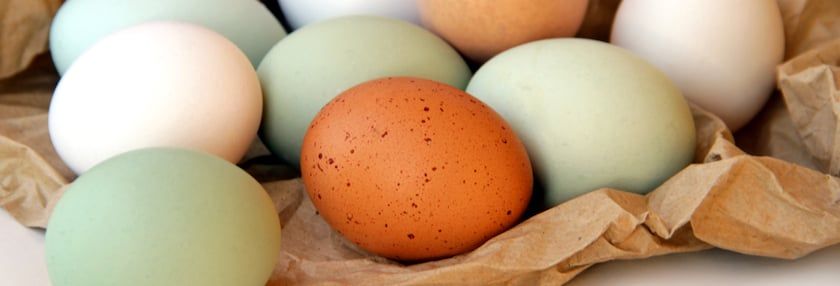Every Morning’s a Surprise


Easter Eggers lay a rainbow of colorful eggs
Want to add some personality to your flock and some pizazz to your egg carton? Look no further than the renowned Easter Egger.
These lovely and docile chickens are known for laying colorful eggs in hues of blue, green, olive, aqua, and sometimes even pink! They are hardy and prolific layers and would make a wonderful addition to any chicken family.
Easter Egger origins
These chickens are affectionately known as “mutts” since they occurred when people bred Araucana and Ameraucanas with other breeds.
Why Araucana and Ameraucanas? These breeds carry the gene for laying blue eggs; when crossed with chickens that lay brown eggs, the result is a plethora of colors!
So, about those eggs
Beyond all else, Easter Eggers are known for their colorful eggs. As mentioned before, the color comes from the blue egg gene found in the “parent heritage” of Easter Eggers.
In 2013, mapping of the chicken genome overturned the mystery of the blue egg. A gene called oocyan and a liver pigment called oocyanin are both responsible for the blue hue.
The blue egg coloration actually permeates the shell; brown eggs are just pigmented onto the outer portion of the shell. You can actually scrub the brown color off!
Easter Eggers are pretty prolific layers, producing around 200 medium-sized eggs a year (which is about 4 eggs per week). Keep in mind that, although these chickens lay colorful eggs, they only lay one color… so whatever her first egg is, that will be the color she will lay!

Personality + plus
Easter Eggers are happy little birds with sweet and docile dispositions. They are very friendly and quirky, making them wonderful little lap pets for beginner chicken owners or children. Being so calm, they tend to be at the bottom of the pecking order and can be bullied by bossier chickens—they are best kept with other non-aggressive breeds. Easter Eggers are known to be curious critters, so keeping them in a secure coop is a must otherwise they may wander a bit too far or try to make friends with predators.
Easter Eggers are tolerant of a wide variety of environments, being cold and hot weather tolerant. They enjoy free-ranging but tolerate confinement so long as they have areas to explore. Easter Eggers are also “neighbor-friendly” (ie: not noisy or destructive).
Appearance is everything
Being a mishmash of different chicken breeds, an Easter Egger’s appearance is as unique as their personalities. However, one of the most unique features almost all Easter Eggers share are their beards! Hens and roosters alike have rather bushy tufts of feathers under their beaks and around their cheeks, giving them an almost chipmunk-like appearance. Some can also have ear tufts.
They are usually upright, with short tails (thanks to their Araucanaheritage) and a slightly pudgy body. Their legs are clean and straight with no feathering and tend to have small pea combs. They are on the smallish side, around 4 to 5 pounds, with colorful plumage ranging from red, black, white and brown.
Easter Eggers tend to be robust and healthy birds, with no pre-disposition to diseases or ailments. One thing to keep an eye on would be parasites in their beards.
So, are Easter Eggers right for you?
In short, Easter Eggers are low maintenance, hardy and healthy chickens that make for great first-timer flock owners. The random plumage guarantees that you will be pleasantly surprised when your chicks grow up to be vastly different from each other, yet still share the same quirky and fun personalities.
Colorful eggs are just the icing on the cake!
Tags:Chicken Chatter

Acreage Life is part of the Catalyst Communications Network publication family.
















